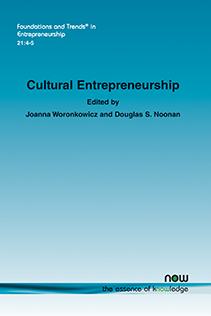Art Incubators as Tools of Cultural Entrepreneurship: Ten Years On
By Linda Essig, Baruch College, The City University of New York, USA, linda.essig@baruch.cuny.edu
Abstract
This work employs a review of recent literature to determine if arts incubators continue to be an important tool for fostering cultural entrepreneurship in the US. It also brings up to date the author’s 2014 typology of arts incubators by examining the current state of the 43 organizations used to develop that typology. That assessment indicates that as the impacts of the Great Recession waned, so too did interest in publicly funded arts incubation programs and that the longevity of arts incubators is correlated with a community-engaged mission and strong leadership.
Cultural Entrepreneurship
This volume explores the concept of Cultural Entrepreneurship, illustrating how creativity, culture, and business come together in innovative ways. Starting with a working definition -- “entrepreneurship in or of culture, including entrepreneurship in the cultural industries and entrepreneurship in the cultural arena of artistic and cultural values” – the volume examines key themes in current research. These include balancing artistic creativity with economic viability, navigating individual agency versus structural constraints in creative careers, and adapting to new business models from traditional arts organizations to emerging digital platforms. Highlighting an interdisciplinary perspective, the volume considers the economic, sociological, and cultural forces shaping entrepreneurial activities in creative realms. It provides both theoretical frameworks and practical insights, presenting cultural entrepreneurship as a dynamic field that combines artistic innovation with economic strategies.

Companion
Foundations and Trends® in Entrepreneurship, Volume 21, Issue 4-5 Special Issue: Cultural Entrepreneurship
See the other articles that are also part of this special issue.